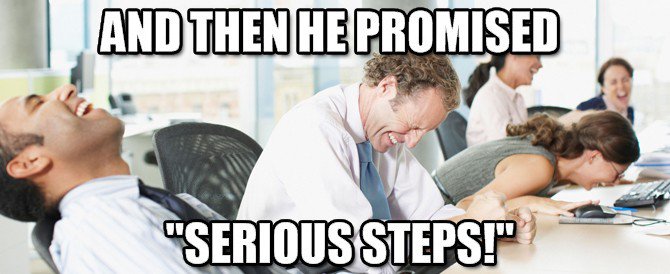Over the last 18 months U.S. Attorney General Eric Holder has borne the brunt of heated criticism that the U.S. has let banks, and their executives, off the hook.
However, he’s now talking tough. Earlier this month he made a much publicised commitment that no bank is too big to jail. Then on Monday he announced that the Swiss bank Credit Suisse is the first bank to plead guilty to a criminal charge in U.S. since 1989 and has agreed to pay a hefty $2.6 billion penalty. The bank pleaded guilty to helping U.S. citizens evade billions of dollars in tax over several decades. Mr Holder is heralding this as proof that no bank is above the law.
The government is walking the talk. The U.S. authorities delivered on the promise he made. Job done.
Or is it?
While reading the hard hitting headlines, senior executives at Credit Suisse might be forgiven for thinking: so what? The penalty is a bit more than the $1.9 billion slap on the wrist that HSBC received in 2012 for letting Latin American drug cartels launder money.

Crucially, Credit Suisse avoided losing its licence to bank in the U.S., an option also known as the “death sentence”. In fact, there was a careful negotiation between the prosecutors and bank regulators to avoid this, based on the same concerns about the potential impact on the economy that Mr Holder originally admitted underpinned the decision to hold back on HSBC. Which begs the question: how does this week’s decision really change anything? Credit Suisse as a corporation hasn’t gone to jail, literally or metaphorically.
The true impact on the bank might best be summed up by its CEO who claimed “we have seen no material impact on our business resulting from the heightened public attention on this issue in the past several weeks.” In fact, their share price actually rose by over 2%, the most in six months, on the announcement.
The U.S. authorities have gone after some individual bankers: eight Credit Suisse employees have been charged, two have recently pleaded guilty and will be sentenced in August. However, this is far from the coup than it seems. A number of those charged remain outside of the U.S. and the Department of Justice hasn’t even sought to extradite them.
And the most senior executives of Credit Suisse seem to have escaped unscathed. At a Congressional Hearing on the matter in February, Senator Levin was clear on how the evidence stacked up, declaring to the bank “you’ve got to acknowledge what is clear [is] that the wrongdoing went beyond a small group of rogue bankers”. The Senate Investigations Committee found that the bank’s practices facilitated U.S. tax evasion, which must mean that their top team were grossly incompetent for not knowing what was going on, or alternatively they were complicit. Yet they remain in place.
It is hard not to think that beyond Eric Holder’s tough words, and the headlines that they have generated, Credit Suisse’s criminal charge and guilty plea does not amount to much.
The fundamental problem is that the incentives for senior management teams to ensure their banks comply with legislation are skewed. The business rewards for taking dodgy money can be high, with very little downside if banks get found out.
In short, it is not until senior bank executives start getting fined, losing their jobs, being barred from practice, and in extreme cases, facing criminal sanctions including jail, that those who are currently not following the rules will start to take these obligations more seriously.
From the response of Credit Suisse’s CEO it is hard to imagine that the senior executives at Credit Suisse will be losing a great deal of sleep over the punishment the bank has received. This was the first of several upcoming cases the U.S. authorities will be ruling on in the coming weeks. It will be interesting to see whether the executives at any of those will have cause to sleep any less comfortably at night.
Stuart McWilliam is Senior Campaigner on Money Laundering at Global Witness. You can follow Stuart on twitter here: @Stuartmcw